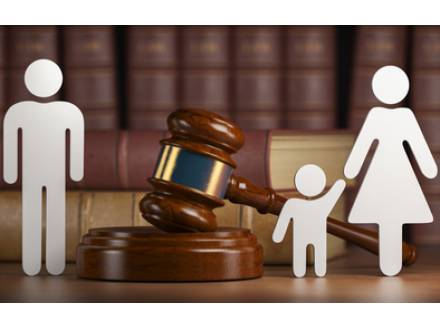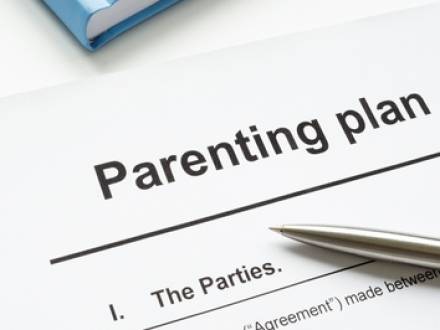Free Initial Consultations
 630-580-6373
630-580-6373With offices in Naperville, Joliet, Wheaton, Plainfield & Chicago
 Although divorce is rarely easy or simple, some divorces are much more difficult than others. When one spouse has a high-conflict personality – like narcissism – the divorce can become exponentially more difficult for the other spouse, the children, and even the divorce attorneys. While one spouse’s narcissistic behaviors are likely to be at least one component of the decision to divorce, the narcissistic spouse can make divorce just as contentious as marriage.
Although divorce is rarely easy or simple, some divorces are much more difficult than others. When one spouse has a high-conflict personality – like narcissism – the divorce can become exponentially more difficult for the other spouse, the children, and even the divorce attorneys. While one spouse’s narcissistic behaviors are likely to be at least one component of the decision to divorce, the narcissistic spouse can make divorce just as contentious as marriage.
Narcissists have an overwhelming desire to "win," so they are unlikely to follow any divorce path that requires compromise and often do their best to drag the divorce out as long as possible. If you are married to a narcissist and are contemplating divorce, it is important that you have a Wheaton, IL, divorce lawyer who is experienced in dealing with high-conflict personalities, including narcissists. Your attorney will know what to expect from your narcissistic spouse – and how to counter every tactic in a way that benefits you.
 Virtually no ex-spouse wants to pay spousal maintenance (also known as spousal support or alimony), yet there are many spouses who deserve this support. Perhaps one spouse worked two low-paying jobs to put the other spouse through medical school, law school, or another profession. Or perhaps one spouse stayed home to raise the children in lieu of career opportunities, so now has few employment options.
Virtually no ex-spouse wants to pay spousal maintenance (also known as spousal support or alimony), yet there are many spouses who deserve this support. Perhaps one spouse worked two low-paying jobs to put the other spouse through medical school, law school, or another profession. Or perhaps one spouse stayed home to raise the children in lieu of career opportunities, so now has few employment options.
In other cases, one spouse may be older now or in poor health, unable to work and make a living independently. There are many good reasons for a court to award spousal support, yet Illinois courts have placed some limits on this support. If you are facing a divorce, the best step you can take is to speak to a knowledgeable Wheaton, IL family law attorney.
The Court will consider a variety of factors when determining whether spousal support should be awarded and, if so, how much and for how long. These factors include the following:
 Divorce can be difficult under any circumstances, but when domestic violence is involved, it is easy to feel overwhelmed. There are some steps you can take during your divorce to protect yourself and your children from a domestic abuser. That being said, if you or your children are in immediate danger, your first priority should always be to find a safe place. Perhaps that is with a trusted friend or relative or a local shelter. If the situation escalates, call 911 if you can do so safely. As soon as you are able, contact an experienced Wheaton, IL family law attorney who has experience with domestic violence and domestic abusers.
Divorce can be difficult under any circumstances, but when domestic violence is involved, it is easy to feel overwhelmed. There are some steps you can take during your divorce to protect yourself and your children from a domestic abuser. That being said, if you or your children are in immediate danger, your first priority should always be to find a safe place. Perhaps that is with a trusted friend or relative or a local shelter. If the situation escalates, call 911 if you can do so safely. As soon as you are able, contact an experienced Wheaton, IL family law attorney who has experience with domestic violence and domestic abusers.
Your first step may be to obtain a protective order that will keep your abusive spouse from contacting you or coming near your home, work, or your child’s school. Your attorney can help you file for a protective order; always keep a copy of the order with you, and if your spouse violates the order, immediately contact the police. It is important to note that protective orders do not always stop violent behavior, and with some abusers, a protective order can increase the danger of the situation. If you fear for your life or the life of your child, never rely exclusively on a protective order.
 The not knowing part of how a child custody case will resolve in family court makes it particularly stressful. In the state of Illinois, child custody is called the allocation of parental responsibilities, and visitation is called parenting time. Every single case that has to do with parents and children is different, but the bottom line remains the same – if you and your spouse are unable to determine how to share parenting responsibilities and parenting time, the court will do it for you.
The not knowing part of how a child custody case will resolve in family court makes it particularly stressful. In the state of Illinois, child custody is called the allocation of parental responsibilities, and visitation is called parenting time. Every single case that has to do with parents and children is different, but the bottom line remains the same – if you and your spouse are unable to determine how to share parenting responsibilities and parenting time, the court will do it for you.
The court will decide whether one or both parents will make major decisions regarding health, religion, education, and extracurricular activities, whether the children will primarily reside with one parent or the parents will share parenting 50/50, and a schedule for parenting time. A parenting plan will be compiled that details virtually every decision regarding raising a child or children. If you are uneasy about how your case will resolve, speaking to a knowledgeable Wheaton, IL parental responsibilities lawyer can be beneficial.
 As of 2018, about one in four couples with one or more children were unmarried. There is simply less societal pressure for younger people to marry than there once was. Yet unmarried couples are still having children, which begs the question of whether unmarried parents have the same rights and responsibilities as married parents – or married parents going through a divorce.
As of 2018, about one in four couples with one or more children were unmarried. There is simply less societal pressure for younger people to marry than there once was. Yet unmarried couples are still having children, which begs the question of whether unmarried parents have the same rights and responsibilities as married parents – or married parents going through a divorce.
When parents are unmarried, there may be questions and issues surrounding paternity, as well as questions regarding the allocation of parental responsibilities (custody), parenting time, and child support. Illinois automatically recognizes paternity if the mother and father are married, but the same is not true when they are not married. If you have questions or issues related to your rights and responsibilities as an unmarried parent, it can be extremely helpful to speak to an experienced Wheaton, IL family law attorney.
 You may see your parenting plan as a general guideline rather than a legally binding contract with your ex-spouse. This belief can land you in trouble with your ex and with the court – which is never where you want to be. Consistently following your parenting plan not only provides your child with stability but also minimizes conflict between parents, setting the stage for a peaceful co-parenting arrangement.
You may see your parenting plan as a general guideline rather than a legally binding contract with your ex-spouse. This belief can land you in trouble with your ex and with the court – which is never where you want to be. Consistently following your parenting plan not only provides your child with stability but also minimizes conflict between parents, setting the stage for a peaceful co-parenting arrangement.
Perhaps your ex is a "by the book" individual, while you believe that the rules of life – and your parenting plan – can be bent when necessary. These two disparate views of life may even be one of the reasons you are divorced. Even if you are not necessarily a rule follower, this may be one area of your life that you may want to adjust your thinking.
If failing to stick to the parenting plan is resulting in arguments between you and your ex – or if you are following the parenting plan but your ex is not – it could be time to speak to an experienced Wheaton, IL family law attorney.
 Suppose you are in the middle of a divorce from your spouse – an already stressful situation – and you lose your job. Suddenly, your stressful situation just became more complex and anxiety-inducing. You will certainly wonder how the loss of your job will affect the issues being decided during your divorce, including marital asset division, spousal maintenance, and the allocation of parental responsibilities.
Suppose you are in the middle of a divorce from your spouse – an already stressful situation – and you lose your job. Suddenly, your stressful situation just became more complex and anxiety-inducing. You will certainly wonder how the loss of your job will affect the issues being decided during your divorce, including marital asset division, spousal maintenance, and the allocation of parental responsibilities.
You will need to immediately inform your divorce attorney and your spouse about the loss of your job. The circumstances around the loss of your job will have an impact on how it affects your divorce issues. An experienced Wheaton, IL family law attorney can help you determine how your job loss will affect your divorce and what steps you need to take to minimize any adverse effects.
 If you have made it through your divorce to the final divorce decree and settlement orders, you may be feeling relief that the ordeal is over and a new chapter in your life can begin. Divorce agreements are meant to provide clear rules for spousal support, the division of assets and debts, and the allocation of parental responsibilities and parenting time.
If you have made it through your divorce to the final divorce decree and settlement orders, you may be feeling relief that the ordeal is over and a new chapter in your life can begin. Divorce agreements are meant to provide clear rules for spousal support, the division of assets and debts, and the allocation of parental responsibilities and parenting time.
A parenting plan that is even more detailed is also included. You assume everything from here on out will be smooth sailing, only to find out it is nothing of the sort. What happens when one spouse refuses to follow court orders? Perhaps your spouse is not paying child support or spousal support as ordered or refuses to bring the children back on time as agreed in the parenting plan.
Maybe he or she was ordered to sell the marital home and split the proceeds, yet nothing is happening in that area. What should you do? The better question may be, what can you do, legally, to force your ex to abide by court rules? This is a situation that will definitely benefit from having a knowledgeable Wheaton, IL family law attorney as your advocate.
 Sometimes, a parent may be so focused on what he or she believes is best for a child during the allocation of parental responsibilities that it is difficult to understand a judge making an entirely different decision, calling it "in the best interests of the child." While custody issues are certainly emotionally charged for all those involved, family court judges must make difficult decisions regarding what is truly best for the child.
Sometimes, a parent may be so focused on what he or she believes is best for a child during the allocation of parental responsibilities that it is difficult to understand a judge making an entirely different decision, calling it "in the best interests of the child." While custody issues are certainly emotionally charged for all those involved, family court judges must make difficult decisions regarding what is truly best for the child.
Each parent may be basing his or her wishes about child custody on the marriage itself rather than what kind of parent the other spouse really is. In short, it can be easy to lose sight of what is in your child’s best interests when you and your spouse are battling to the death about every other aspect of your divorce.
So, even though you might be happy if your child never saw your soon-to-be ex again, a judge may have a more impartial view of the situation. If you are currently facing a parental responsibilities issue or have other family law issues, you could benefit from speaking to an experienced Wheaton, IL family law attorney.
 When a child resists or refuses contact with a parent following a divorce, the cause could be difficult to determine. If the child is refusing contact because of parental alienation, this is a very serious issue that can potentially result in a change to custody (the allocation of parental responsibilities). This is because an alienating parent is perpetrating a type of psychological abuse on the child when deliberately convincing the child that his or her other parent is "bad" or is wholly responsible for the divorce.
When a child resists or refuses contact with a parent following a divorce, the cause could be difficult to determine. If the child is refusing contact because of parental alienation, this is a very serious issue that can potentially result in a change to custody (the allocation of parental responsibilities). This is because an alienating parent is perpetrating a type of psychological abuse on the child when deliberately convincing the child that his or her other parent is "bad" or is wholly responsible for the divorce.
If parental alienation is not the reason the child is resisting or refusing contact with a parent, then the reason must be determined. The age of the child and the reason for the refusal will have some bearing on whether a judge will force the child to engage in parenting time. If you are experiencing a similar situation, speaking to a knowledgeable Wheaton, IL family law attorney can be extremely helpful.
